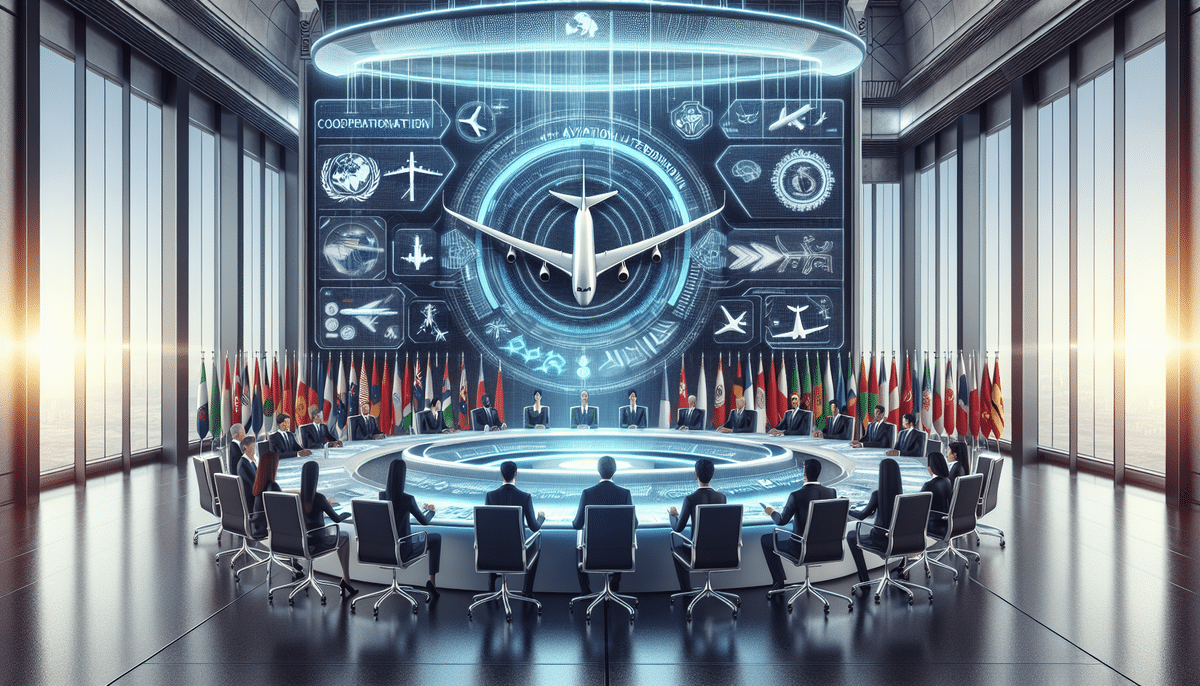Introduction to the International Air Transport Association (IATA)
The International Air Transport Association (IATA) is a globally recognized trade association of airlines established to promote and foster safe, reliable, and affordable air transport for all people and goods. With over 290 member airlines from 120 countries, IATA has been at the forefront of shaping the aviation industry for more than 75 years. This comprehensive guide explores IATA's role in the aviation industry, its history, membership benefits, governance structure, impact on policies and sustainability, and its future outlook.
Governance and Structure of IATA
How IATA Is Structured and Governed
IATA is governed by a Board of Governors consisting of 31 airline CEOs and elected representatives from the five largest airlines by revenue in North America, Asia-Pacific, Europe, Latin America & the Caribbean, and the Middle East & Africa. The organization also has an Executive Leadership Team overseeing day-to-day operations and strategic initiatives. IATA's structure includes various committees, subcommittees, and working groups composed of subject matter experts and airline representatives.
One key committee is the Safety and Flight Operations Committee, responsible for developing and promoting global safety standards and best practices. This committee collaborates with airlines, regulators, and other industry stakeholders to ensure safety remains a top priority.
In addition to governance, IATA offers a range of services and products to its members, including training programs, industry data and analysis, and advocacy on critical issues affecting the aviation sector. These services are designed to help airlines operate more efficiently, adhere to safety standards, and promote industry growth and sustainability.
Benefits of IATA Membership
The Benefits of Being a Member of IATA
Membership in IATA provides airlines with numerous advantages, such as access to valuable industry research and data, training and certification programs, safety and security initiatives, regulatory and policy advocacy, and the standardization of operational procedures. Additionally, IATA membership allows airlines to build relationships with industry stakeholders and participate in exclusive events and conferences.
One significant benefit is access to the IATA Clearing House, a secure and efficient system for settling financial transactions between airlines. This system reduces the risk of payment defaults and fraud, ensuring timely and accurate payment processing.
Moreover, IATA members can engage in environmental sustainability initiatives like the Carbon Offset and Reduction Scheme for International Aviation (CORSIA). This program aims to reduce the aviation industry's carbon footprint by offsetting emissions through the purchase of carbon credits and promoting the use of fuel-efficient aircraft and sustainable aviation fuels.
IATA's Impact on Aviation Policies and Sustainability
The Impact of IATA on Air Travel Policies and Regulations
IATA plays a pivotal role in shaping global air travel policies and regulations. It was instrumental in the establishment of the International Civil Aviation Organization (ICAO), which regulates international civil aviation. IATA has also developed industry standards such as the Ticketing Handbook and the Standard Ground Handling Agreement (SGHA). Recently, IATA has been involved in the rollout of the Single African Air Transport Market (SAATM), aiming to create a unified air transport market across Africa.
In terms of sustainability, IATA launched the Aviation Carbon Reduction Program, which aligns with the Paris Agreement and other sustainability objectives. The program focuses on reducing carbon emissions through eco-efficient operations, alternative fuels, and innovative technologies.
The Role of IATA in Promoting Sustainability in Aviation
Sustainability is a critical focus area for IATA. The organization supports research and development to enhance eco-efficient operations, innovate alternative fuels, and implement new technologies to minimize the environmental impact of air travel. IATA's initiatives include the promotion of sustainable aviation fuels (SAFs) and the development of strategies to achieve carbon-neutral growth by 2020 and reduce net carbon emissions by 50% by 2050.
IATA's Role in Safety, Security, and Technology
The Role of IATA in Promoting Safety and Security in Air Travel
Safety and security are paramount concerns in the aviation industry. IATA has developed comprehensive industry standards and recommended practices to enhance safety and security. These measures address risks related to illegal shipments, counter-terrorism, and the implementation of advanced technological solutions to improve passenger experience and satisfaction.
Furthermore, IATA provides extensive training and certification programs to ensure airlines maintain world-class safety and security standards. Initiatives like the IATA Operational Safety Audit (IOSA) are globally recognized standards that help airlines operationalize safety protocols effectively.
The Role of Technology in the Evolution of IATA
Technology plays an increasingly crucial role in aviation, and IATA is at the forefront of integrating technological advancements to benefit its members. The organization has developed the New Distribution Capability (NDC), a technology standard that allows airlines to better manage and customize fares and ancillary services, enhancing the passenger booking experience.
IATA is also exploring emerging technologies such as blockchain, artificial intelligence, and biometric authentication to streamline operations, enhance security, and improve overall efficiency within the aviation sector.
Market Dynamics and Distribution
How IATA Influences the Pricing and Distribution of Airline Tickets
As the world’s largest trade association of airlines, IATA significantly influences pricing and distribution within the air travel industry. The Billing and Settlement Plan (BSP) provides an efficient, cost-effective, and reliable distribution and financial settlement service for airline tickets. Additionally, the New Distribution Capability (NDC) allows airlines to offer more personalized and dynamic pricing structures, improving the passenger booking experience and operational efficiency.
Exploring the Global Reach of the International Air Transport Association
IATA's influence extends globally, with regional offices in Africa, Asia-Pacific, Europe, Latin America, the Middle East, and North America. The organization's expansive reach allows it to collaborate with industry stakeholders worldwide, ensuring that its standards and initiatives are adopted across diverse markets and emerging regions.
Challenges and Future Outlook
The Challenges Facing IATA in a Rapidly Changing Aviation Industry
The aviation industry is continually evolving, presenting numerous challenges for IATA. These include rapid technological advancements, cybersecurity threats, shifts in passenger demographics, and workforce limitations. Additionally, external factors such as geopolitical tensions and economic fluctuations can impact global air travel. IATA collaborates closely with member airlines and industry stakeholders to navigate these challenges effectively and ensure resilient and adaptive industry practices.
The Future Outlook for IATA and Its Role in Shaping Air Travel
Despite facing significant challenges, IATA remains a cornerstone of the aviation industry, committed to promoting sustainable and secure air travel. The organization is focused on advocating for policies and programs that foster global connectivity, innovation, and seamless travel experiences. IATA’s forward-thinking approach emphasizes safety, efficiency, and sustainability, ensuring that the aviation industry meets the evolving needs of passengers and stakeholders.
Joining IATA
How to Become a Member of IATA
Airlines interested in becoming members of IATA must meet specific criteria, including holding a valid air carrier license, meeting financial requirements, and complying with IATA's operational and safety standards. Prospective members should contact IATA directly for detailed information on the application process and membership benefits.
Conclusion
In conclusion, IATA has been instrumental in shaping the aviation industry over the past 75 years. Its dedication to safety, security, sustainability, and innovation has significantly contributed to the global growth and development of air travel. As the industry continues to evolve, IATA remains committed to leading through advocacy, collaboration, and the implementation of best practices. By staying aligned with industry trends and addressing emerging challenges, IATA ensures a prosperous and sustainable future for the aviation sector worldwide.




















